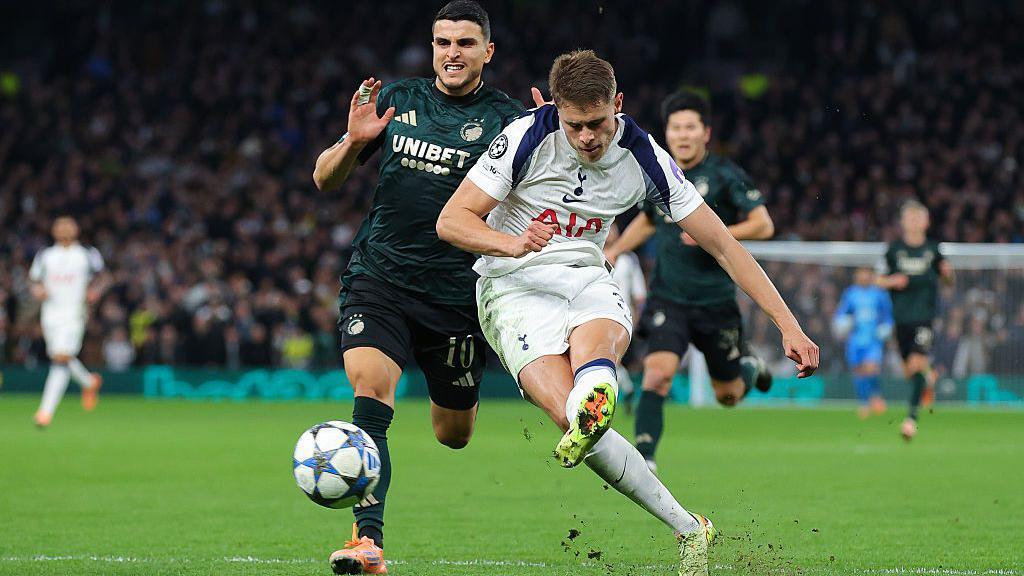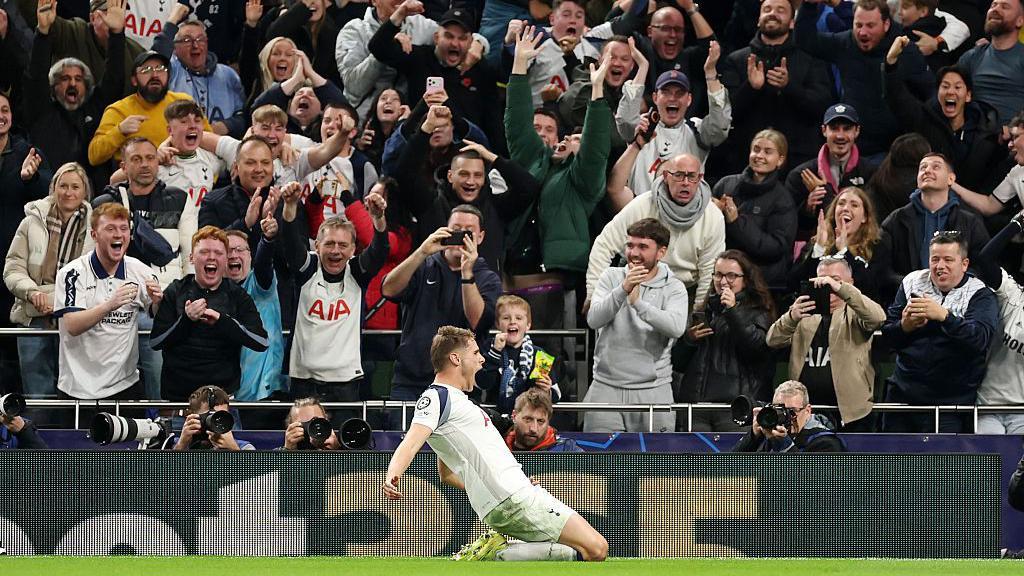Micky van de Ven’s Goal: A Divine Moment That Challenges the Very Nature of Football’s Hierarchy and Legacy
In the world of football, moments of brilliance can transcend the sport itself, igniting debates that resonate far beyond the pitch. Micky van de Ven’s stunning goal during a Champions League match against Copenhagen has become one such moment, drawing comparisons to the likes of Lionel Messi and raising questions about the roles and expectations of players in different positions. The goal, scored by a centre-half under immense pressure, serves as a powerful reminder of the fluidity of football and the potential for greatness in unexpected places.
Van de Ven’s journey from his own penalty area to the opposition’s goal is a narrative that encapsulates the essence of modern football. With Tottenham Hotspur leading 2-0 but reduced to ten men, the stakes were high. The Dutch defender could have opted for a safer route, clearing the ball to safety. Instead, he took a bold step forward, sprinting past multiple opponents with a combination of speed, strength, and skill that is rarely seen from defenders. This audacious run not only showcased his individual talent but also highlighted a shift in the game where defenders are increasingly expected to contribute to attacking play.
The goal itself was a masterclass in composure and precision. After outpacing a Copenhagen defender, Van de Ven slotted the ball past goalkeeper Dominik Kotarski, igniting a wave of jubilation among Spurs fans and teammates alike. The sheer audacity of the goal was not lost on pundits and former players, who were quick to draw parallels with Messi, a player synonymous with dribbling brilliance and game-changing moments. Thomas Frank, the opposing manager, remarked that it was as if “Lionel Messi had turned into Van de Ven,” a statement that underscores the magnitude of the achievement.
Owen Hargreaves, a former England midfielder, declared it one of the best goals he had ever seen, emphasizing the ease with which Van de Ven navigated through defenders. This sentiment was echoed by Nedum Onuoha, who pointed out the difficulty in defending against a player of Van de Ven’s size and speed. The goal not only showcased individual brilliance but also raised questions about the tactical approaches employed by teams when faced with defenders who possess such attacking capabilities.
In the context of football history, defenders have often been relegated to the background, their contributions overshadowed by the glamour of forwards and attacking midfielders. However, the evolution of the game has seen a growing recognition of the importance of versatile defenders. Players like Franz Beckenbauer, Paolo Maldini, and more recently, Virgil van Dijk, have blazed trails that challenge traditional perceptions of defensive roles. Van de Ven’s goal is a testament to this evolution, illustrating that defenders can be game-changers in their own right.
The tactical landscape of football has shifted dramatically in recent years, with teams increasingly adopting formations that allow defenders to push forward and participate in attacking plays. The rise of the “sweeper-keeper” and the emphasis on ball-playing defenders have transformed the role of the centre-half. Van de Ven’s goal exemplifies this trend, as he not only contributed defensively but also became a pivotal figure in his team’s offensive strategy.
Furthermore, the psychological aspect of such a goal cannot be overlooked. Scoring from a defensive position, especially in a high-stakes match, can significantly impact a player’s confidence and the team’s morale. It sends a message to both teammates and opponents that the game is not over until the final whistle. For Tottenham, who were under pressure after losing a player, Van de Ven’s goal provided a much-needed boost and a reminder of their fighting spirit.
As the football world continues to dissect this extraordinary moment, it raises broader questions about the nature of greatness in the sport. Is a goal like Van de Ven’s a one-off, or does it signify a new era where defenders are celebrated for their attacking prowess? The comparisons to Messi are provocative, suggesting that greatness is not confined to traditional roles but can emerge from anywhere on the pitch.
In the aftermath of the goal, discussions surrounding the evolution of football tactics and player roles are likely to intensify. Coaches and analysts will undoubtedly study Van de Ven’s run, seeking to understand how such moments can be replicated. The goal serves as a case study in the importance of adaptability and creativity in modern football, where the lines between defense and attack are increasingly blurred.
Moreover, the cultural implications of such a goal extend beyond the tactical realm. It challenges the narrative that certain positions are inherently less glamorous or impactful. Van de Ven’s achievement resonates with a broader audience, inspiring young players to believe that they, too, can make a mark regardless of their position on the field. This democratization of talent in football is a powerful message, one that encourages creativity and ambition in every aspiring player.
As the dust settles on this remarkable moment, it is clear that Micky van de Ven’s goal will be remembered not just for its technical brilliance but for its role in reshaping perceptions of what is possible in football. The comparisons to Messi may be hyperbolic, but they reflect a growing recognition that greatness can emerge from the most unexpected places. The goal is a celebration of football’s unpredictability, a reminder that every player, regardless of their position, has the potential to create magic on the pitch.
The reverberations of Van de Ven’s goal will likely be felt for years to come, influencing how players are trained, how teams are structured, and how fans appreciate the beautiful game. It stands as a testament to the evolving nature of football, where boundaries are constantly being pushed, and the definition of greatness is forever in flux.
You know you have scored a special goal when you are being compared to Lionel Messi.
Even more so if you are a centre-half.
With Tottenham leading 2-0 but down to 10 men and coming under pressure from opponents Copenhagen, Micky van de Ven could have been forgiven for launching the ball to safety when he got it on the edge of his own penalty area.
But the Netherlands defender had other ideas.
Off he went, sprinting past one, two, three players, squeezing past another two near the halfway line and outpacing a Copenhagen defender to get through on goal with the Spurs fans rising as one in anticipation.
And the finish did not disappoint, with Van de Ven slotting the ball past goalkeeper Dominik Kotarski, before being mobbed by jubilant team-mates having scored one of the great Champions League goals.

Afterwards, boss Thomas Frank said it was like "Lionel Messi had turned into Van de Ven".
"It’s one of the best goals you will ever see, ever," said former England midfielder Owen Hargreaves on TNT Sports.
"He runs past players like they’re not even there. To stay strong and then to finish, that’s ridiculous. Goal of the season, game over."
Former Manchester City defender Nedum Onuoha, speaking on Match of the Day: Champions League added: "It’s top. Really, really good.
"When defenders go on those runs, it’s hard to understand who should stop them. With the size and the speed he has, we actually saw a player on the other side of the pitch who wanted nothing to do with him."

Speaking on BBC Radio 5 Live, former Premier League defender Curtis Davies added: "He kind of stepped out looking for a pass and nothing was on. Once he saw the space ahead of him he knew nobody was catching him.
"He was at full tilt, full pace."
Read more on the stunning goal here
